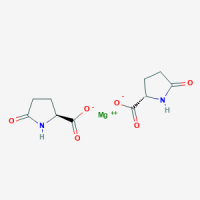Magnesium (II) pidolate, also known as magnesium pyroglutamate, is the magnesium salt of L-pyroglutamic acid. It can be made by reacting magnesium hydroxide (milk of magnesium) with L-pyroglutamic acid (free zwitterion) in a 2:1 molar ratio. Pyroglutamic acid is a ubiquitous and naturally-occuring amino acid, and a ring-cyclized form of glutamic acid. It is closely related to proline. Magnesium salts of amino acids are known as “magnesium chelates”. They are widespread in nature, essential to the human diet and widely approved for usage as nutritional supplements and dietary additives.
Oral supplementation of magnesium pidolate has shown to treat sickle cell disease in clinical trials. It works by inhibiting potassium-chloride ion channels and thereby reducing dehydration in humans. According to one study involving 20 patients, “the median number of painful days in a 6‐month period decreased from 15 (range 0–60) in the year before the trial to 1 (range 0–18; P < 0.0005) during the period of [magnesium pidolate] therapy.” This indicates that magnesium pidolate can significantly alleviate pain and improve quality of life in sickle cell patients. However, the results of the open-label, unblinded study may be inconclusive.
In a phase I clinical trial conducted on children with sickle cell disease, which was intended to measure the potential toxicity of magnesium pidolate, magnesium pidolate was found to enhance the effects of hydroxycarbamide (Hydrea®), a prescription medication. It was found to significantly improve the condition of patients compared to hydroxycarbamide alone.
In one placebo-controlled clinical trial, magnesium pidolate was found to improve the conditions of patients with non-insulin-dependent diabetes mellitus. According to the study, “chronic [magnesium pidolate] supplementation produced a significant reduction of plasma cholesterol and LDL cholesterol, and an increase of HDL cholesterol.”
This compound has shown to be potentially useful in the treatment of primary dysmenorrhea.
Magnesium itself has effects as an NMDA antagonist in the human body, and shares pharmacological similarities to ketamine. Magnesium also may have synergistic effects when combined with ketamine in the treatment of neuropathic pain and depression.
Magnesium pidolate
- Product Code: Magnesium pidolate [TOP QUALITY]
- Availability: In Stock
-
$10.00
-
- 5 or more $7.00
- 10 or more $4.00
- 25 or more $3.00
- 50 or more $1.70
- 100 or more $1.20
Tags: Magnesium pidolate, Nootropics, buy Phenibut online, top quality Phenibut, Phenibutusa, Nootropics usa

